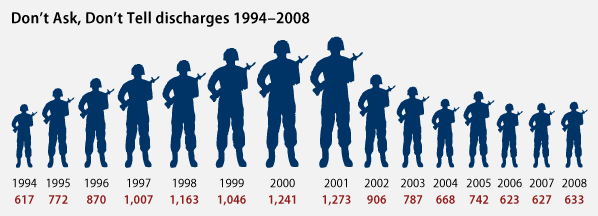Among the most ridiculous of all government policies is the idea that someone was “the wrong type” to be in the military. For years gay people were prohibited from joining the military. As absurd as this policy was, the government made it worse in 1993 when it began the policy called “Don’t Ask, Don’t Tell” which implied that Gender and Sexual Minorities (GSM) should keep their private lives to themselves. This meant that a straight pilot could carry a picture of his wife with him, but a GSM woman could not carry a picture of her partner with her.
This double standard essentially codified the idea that there was something “wrong” with being GSM, by saying that such behavior had to be hidden. It wasn’t until 2013 that Don’t Ask Don’t Tell was repealed and all members of the service were considered equal before the rules.
But of course, once the government condones or condemns a behavior, it’s part of the culture, and though the policy has changed, beliefs are still strong, as related to us today by a member of People For Liberty.
“I came out as bi when I was in 6th grade (2006). I knew I wanted to join the military in 7th grade (2007). I didn’t know of Don’t Ask, Don’t Tell (DADT) until I was in high school. I had two options: plan a new career for myself or go back in the closet. Neither of these options was good for me. I was riding to school with my dad when he told me that DADT was repealed in 2011. I cried. I cried because I didn’t have to go back in the closet.
When I joined in 2013, I still went back in the closet. It had only been 2 years and DADT was still taught to my leadership. I became hypermasculine to hide. I didn’t hide from policy; I hid from jokes and hazing, I hid from being the outsider. I was able to explore my sexuality out of uniform but as soon as I put my uniform back on, I was back to being hyper-masculine. Even today, I have shipmates who don’t know my sexuality. The policy might be gone, but much more work is still to be done.”
– Josh C., Navy, 2013-2017

